

Book Creators. Grammar. BlackOutPoetry. Usa. National Archives - Vietnam War Records. Www.randomhouse.com.au/content/teachers/tsk absolutely true diary.pdf. The Absolutely True Diary of a Part-Time Indian by Sherman Alexie. Analysis: Drinking Problems in Reservations To become addicted to alcohol has different reasons.

Having problems is one of them. It is also the reason why so many Indians become/became alcoholics. Alcohol was meant to help to forget their difficult situations. But instead of helping these … Continue reading After having read the first chapters… Hi everybody out there I am a student in year 10 of the Kant-Gymnasium Weil am Rhein. The Absolutely True Diary of a Part-Time Indian Storia Teaching Guide. Book Summary Arnold, aka Junior, introduces his hardscrabble life on the Spokane Indian reservation in the first chapter called The Black-Eye-of-the-Month Club.

Through his “absolutely true” diary, Arnold describes his impediments and vulnerabilities, the biggest of which is living on a reservation where he is a zero with a zero future. A pivotal conversation with a teacher spurs Arnold to make a daring life choice—to attend an all-white school miles from the reservation. His rocky start there, riddled with stereotypes and misunderstandings, slowly develops into surprising friendships and successes in academics and basketball.
"The Absolutely True Diary of a Part-Time Indian" Sherman AlexieThe author's official home page.

Sara Bruuns klassrum: Say Geronimo! The_absolutely_true_diary_of_a_part-time_indian_lessons_and_resources. The Absolutely True Diary of a Part-Time Indian : Sherman Alexie. Humanoid Robots. Reading. Intelligence Artificielle.
Edward Hopper. "Edward Hopper, the best-known American realist of the inter-war period, once said: 'The man's the work.
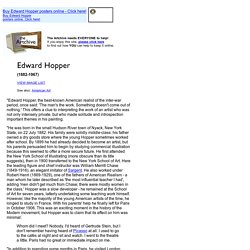
Something doesn't come out of nothing.' This offers a clue to interpreting the work of an artist who was not only intensely private, but who made solitude and introspection important themes in his painting. "He was born in the small Hudson River town of Nyack, New York State, on 22 July 1882. His family were solidly middle-class: his father owned a dry goods store where the young Hopper sometimes worked after school. By 1899 he had already decided to become an artist, but his parents persuaded him to begin by studying commercial illustration because this seemed to offer a more secure future. Whom did I meet? "In addition to spending some months in Paris, he visited London, Amsterdam, Berlin and Brussels. "From the time of his marriage, Hopper's professional fortunes changed. "Hopper became a pictorial poet who recorded the starkness and vastness of America.
EDIT: EDWARD HOPPER. L’autoportrait (1925 - 1930) : maîtrise du cadre et du dessin.
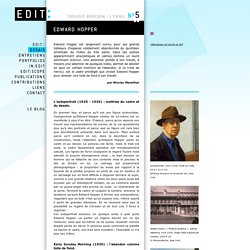
En premier lieu, et parce qu’il est une figure primordiale, l’autoportrait qu’Edward Hopper réalise de lui-même est un manifeste à plus d’un titre. D’abord, parce qu’on associe son travail aux représentations de scènes de la vie quotidienne plus qu’à des portraits et parce que sa figure est rare bien que discrètement présente dans son œuvre. Mais surtout parce qu’il contient en soi, dans la discrétion de sa construction, toute l’attention qu’Edward Hopper porte au cadre et au dessin. Le pinceau est lâche, mais le trait est juste, le cadre faussement spontané est minutieusement calculé. Les lignes de force soulignent le regard fuyant mais attentif, la bouche étrangement close ; le trait dessine un homme qui se détache de son contexte mais le pinceau le fait se fondre en lui. Early Sunday Morning (1930) : l’abandon comme toile de fond.
Nighthawks (1942) : jeux de regards. Notes. Pdf_E._Hopper.pdf (Objet application/pdf) Edward Hopper Review. Edward Hopper saw an America that no other painter had got right.
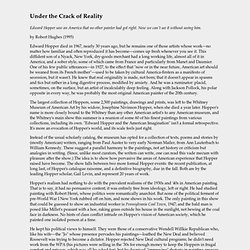
Now we can't see it without seeing him. by Robert Hughes (1995) Edward Hopper died in 1967, nearly 30 years ago, but he remains one of those artists whose work—no matter how familiar and often reproduced it has become—comes up fresh whenever you see it. This diffident son of a Nyack, New York, dry-goods merchant had a long working life, almost all of it in America, and a sober style, some of which came from France and particularly from Manet and Daumier.
One of his few public utterances—in 1927, to the effect that "now or in the near future, American art should be weaned from its French mother"—used to be taken by cultural America-firsters as a manifesto of secession, but it wasn't. Edward Hopper. Edward Hopper déclarait en 1964, en préambule pour une interview sur NBC : "Je sais bien que des peintres contemporains vont manifester le plus grand mépris pour cette citation.

Mais je la lirai quand même. Goethe a dit : "La fin première et dernière de toute activité littéraire, c'est la reproduction du monde qui m'entoure via le monde qui est en moi ; toute chose devant être saisie, reprise et recrée, assimilée et reconstruite sous une forme personnelle et originale". Edward Hopper, American Realist Artist, Urban Genre-Painter: Biography, Art Style, Famous Paintings: "House by the Railroad", "Nighthawks", "Gas" Recognition and Commercial Success The 1920s finally brought Hopper the breakthrough he sought.
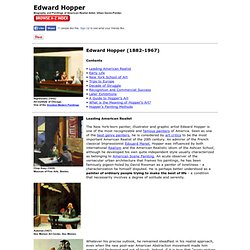
His etchings began to receive a degree of public recognition, and his oil painting (as in New York Interior, 1921; New York Restaurant, 1922) - if not yet appreciated by curators and exhibition juries - was becoming more inspired. He also began painting watercolours outdoors during the summer at Gloucester, a small town on the Massachusetts coast, except that while other painters were fully absorbed painting seascapes and scenic views, Hopper was fascinated by the large Victorian houses built by rich sea captains during the previous century. Hopper l’illusionniste. English translation.
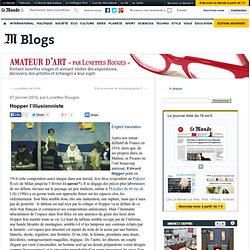
Edward Hopper (18821967)